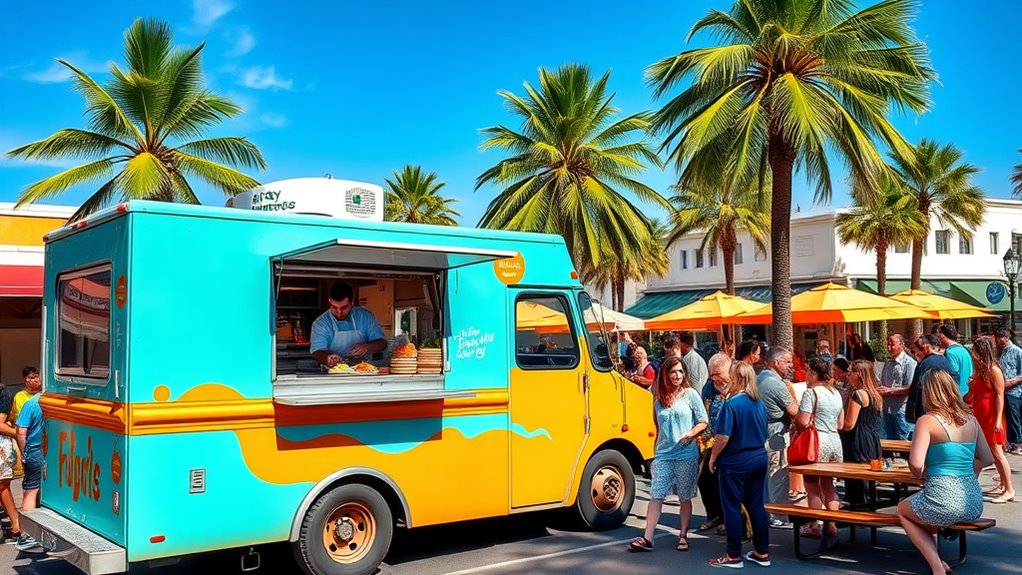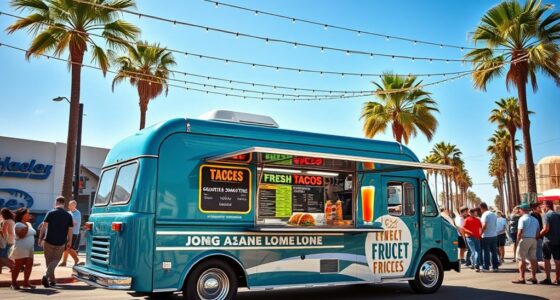To start a food truck in Jacksonville, FL, you’ll need to navigate local regulations, secure permits through online portals, and choose designated parking zones to stay compliant. Set up your kitchen efficiently, plan a budget, and consider financing options like small business loans. Develop a catchy menu, integrate technology, and build your brand through social media and community events. Keep exploring these steps to guarantee a successful launch and growth in Jacksonville.
Key Takeaways
- Understand Jacksonville’s local licensing, permits, and zoning laws; apply via online portals and schedule inspections early.
- Secure suitable food truck and kitchen space, considering shared kitchen options for cost efficiency and compliance.
- Obtain necessary liability insurance and plan for licensing fees, including health department approvals and renewal costs.
- Develop a compelling menu using local ingredients, and integrate technology like mobile POS for efficient operations.
- Build brand awareness through community engagement, networking, food festivals, and high-quality food photography.
Starting Your Culinary Adventure
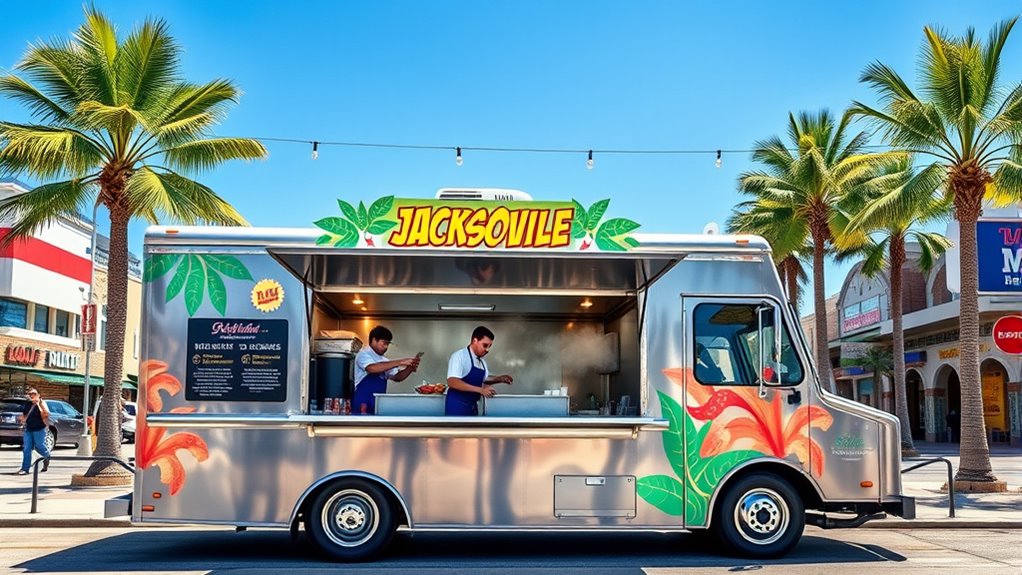
Starting your culinary adventure begins with embracing your passion for food and identifying what makes your offerings unique. Focus on strong food truck branding that captures your style and appeals to your target audience in Jacksonville. Stay current with culinary trends to keep your menu fresh and exciting, whether it’s fusion dishes, plant-based options, or locally inspired flavors. Experiment with different recipes and presentation styles to stand out on the street. Your branding should reflect your personality and the vibe you want to create, making it easier for customers to remember you. Incorporate farmhouse furniture elements into your branding and truck decor to evoke a warm, inviting atmosphere that resonates with many customers. Keep an eye on popular trends to ensure your menu remains relevant and enticing. By blending your passion with strategic branding and trend awareness, you set a solid foundation for your food truck journey.
Understanding Local Requirements
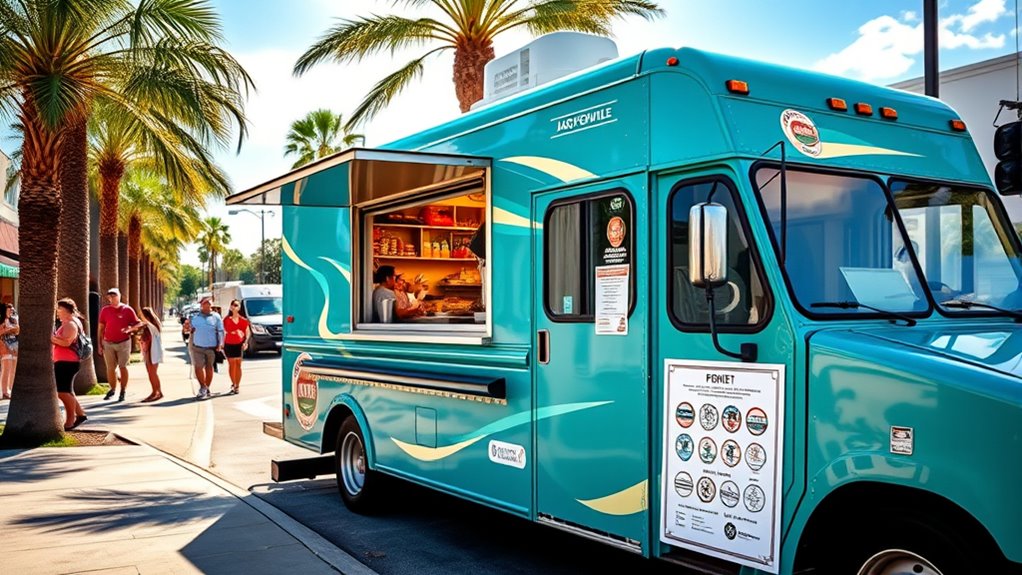
To get started, you’ll need to use the online permit application portals to submit your paperwork efficiently. It’s also smart to schedule your inspection appointment early so you don’t face delays. Don’t forget to familiarize yourself with designated truck parking zones to stay compliant with local regulations. Additionally, understanding local zoning laws can help ensure your food truck operations meet all necessary requirements.
Online Permit Application Portals
Finding your way through Jacksonville’s online permit application portals is essential to make certain your food truck complies with local regulations. These online permit systems streamline the process, allowing you to submit necessary documentation quickly and efficiently. When browsing portal applications, confirm you have all required information ready, such as business licenses, health permits, and vehicle details. The online permit portal offers step-by-step guidance, helping you understand specific requirements for food trucks in Jacksonville. By using these portals, you can track your application status and receive updates directly. Familiarizing yourself with the online permit process saves time and reduces the risk of errors, making it easier to start your food truck business smoothly and stay compliant with local rules.
Schedule Inspection Appointment Early
Scheduling your inspection appointment early is essential to avoid delays in launching your food truck. Inspection scheduling can be a time-sensitive process, so booking your appointment well in advance guarantees you meet all local requirements without rushing. By securing an early appointment, you give yourself ample time to address any issues that may arise during the inspection, avoiding last-minute setbacks. Check Jacksonville’s specific health and safety standards and plan accordingly. Remember, some inspections require coordination with multiple agencies, so it’s best to schedule as soon as possible after completing initial permit paperwork. An early appointment helps you stay on track for your opening date and reduces stress during the final stages of preparation. Prioritize inspection scheduling to keep your food truck journey moving smoothly.
Designated Truck Parking Zones
After securing your inspection appointment, it’s important to familiarize yourself with Jacksonville’s designated truck parking zones. These zones are established to guarantee compliance with local parking regulations and to promote safe, organized parking for food trucks. You must adhere to zone enforcement rules, which specify where you can and cannot park your truck. Parking regulations may vary by area, so double-check signage and markings in each zone. Ignoring designated zones can result in fines or penalties, so always park within approved areas. Proper understanding of these zones helps you avoid violations and ensures you’re operating legally. Staying updated on zone enforcement policies makes managing your truck’s parking smoother and keeps your business running without unnecessary interruptions.
Setting Up Your Base of Operations
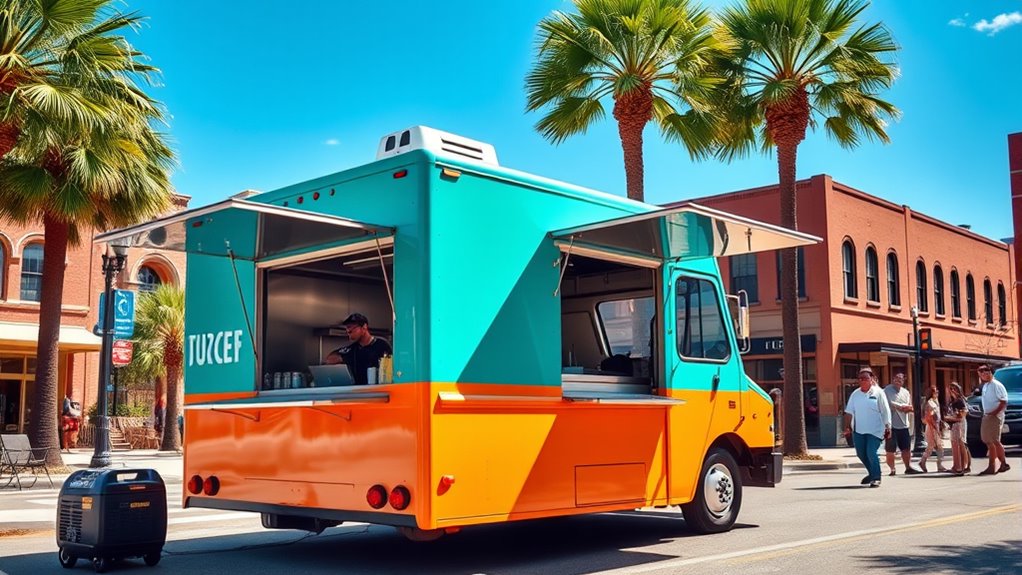
Choosing the right space for your base of operations is essential, and shared kitchen licensing options can save you time and money. Planning a custom kitchen layout ensures your setup meets your specific needs and complies with local regulations. Consider your options carefully to create an efficient and legal foundation for your food truck business. Incorporating aquatic exercise principles into your planning can also improve team flexibility and efficiency during setup and operation.
Shared Kitchen Licensing Options
Setting up your base of operations often involves choosing a shared kitchen license, which can streamline costs and simplify compliance. Shared kitchen licensing options allow you to operate within a licensed culinary co-op, reducing the need for a dedicated facility upfront. These co-ops meet culinary regulations and offer versatile spaces for food prep and storage. When selecting a shared kitchen, consider factors like location, amenities, and licensing requirements. Here’s a quick comparison:
| Feature | Shared Kitchen License | Culinary Co-op Regulations | Cost Range |
|---|---|---|---|
| Licensing Requirements | Simplified | State & local compliance | $500-$2,000/mo |
| Facility Access | Flexible | Standards adherence | Included |
| Equipment Provided | Varies | Health & safety standards | Varies |
| Operating Hours | Varies | Food safety protocols | Flexible |
| Community Support | Yes | Licensing compliance | Included |
Choosing the right shared kitchen helps you stay compliant and control startup costs.
Custom Kitchen Layout Planning
Designing an efficient kitchen layout is essential for maximizing workflow and ensuring food safety. To optimize your space, focus on layout optimization by carefully arranging your kitchen equipment for seamless movement. Consider these key steps:
- Map out your workflow from prep to serving, placing equipment accordingly.
- Position heavy-duty appliances like grills and fryers close to prep stations.
- Ensure sufficient space between stations to prevent cross-contamination.
- Incorporate storage solutions for ingredients and utensils to keep your workspace organized.
Budgeting and Financing Your Food Truck

To start your food truck business, you’ll need to contemplate costs like initial vehicle licensing fees and how to finance your purchase. Small business loan programs can help you secure the funds you need, but it’s also important to budget for liability coverage to protect your operation. Understanding these financial aspects will set a strong foundation for your success in Jacksonville. Additionally, being aware of toilet maintenance and repair costs can help you plan for any unexpected expenses associated with your business facilities or mobile setup.
Initial Vehicle Licensing Fees
Initial vehicle licensing fees in Jacksonville, FL, can vary depending on the type and size of your food truck, but it’s essential to account for these costs early on. You’ll need to cover vehicle registration and licensing fees to operate legally. Planning ahead ensures you avoid surprises and stay compliant.
Here are four key points to contemplate:
- The cost of vehicle registration depends on the truck’s weight and specifications.
- Licensing fees may include local permits and health department approvals.
- Fees can range from a few hundred to over a thousand dollars.
- Some costs are annual, so budget for renewal fees as well.
Understanding these fees helps you allocate funds properly and avoid delays in launching your food truck.
Small Business Loan Programs
Securing the right funding is essential when starting a food truck, and small business loan programs can be a valuable resource. These small business loan options provide the necessary capital to cover startup costs like equipment, permits, and inventory. Many financial assistance programs are tailored specifically for small businesses, offering favorable terms and lower interest rates. You can explore options such as SBA loans, local bank loans, or alternative lenders that specialize in small business financing. It’s important to compare the terms, repayment schedules, and eligibility requirements to find the best fit for your needs. With the right financial backing, you’ll be better positioned to launch your food truck confidently and sustain your operations as you grow in Jacksonville.
Liability Coverage for Food Trucks
Liability coverage is a critical aspect of budgeting and financing your food truck because accidents and mishaps can happen unexpectedly. Proper food truck insurance, especially liability coverage, protects you from financial ruin if someone gets injured or property is damaged. To guarantee you’re adequately covered, consider these key points:
- Understand the minimum liability insurance required by Florida law.
- Opt for all-encompassing food truck insurance that includes liability coverage.
- Budget for higher coverage limits to protect your assets.
- Regularly review and update your liability coverage as your business grows.
Having solid liability coverage gives you peace of mind and secures your investment, so you can focus on serving great food in Jacksonville without worry.
Designing Your Menu and Pricing Strategy
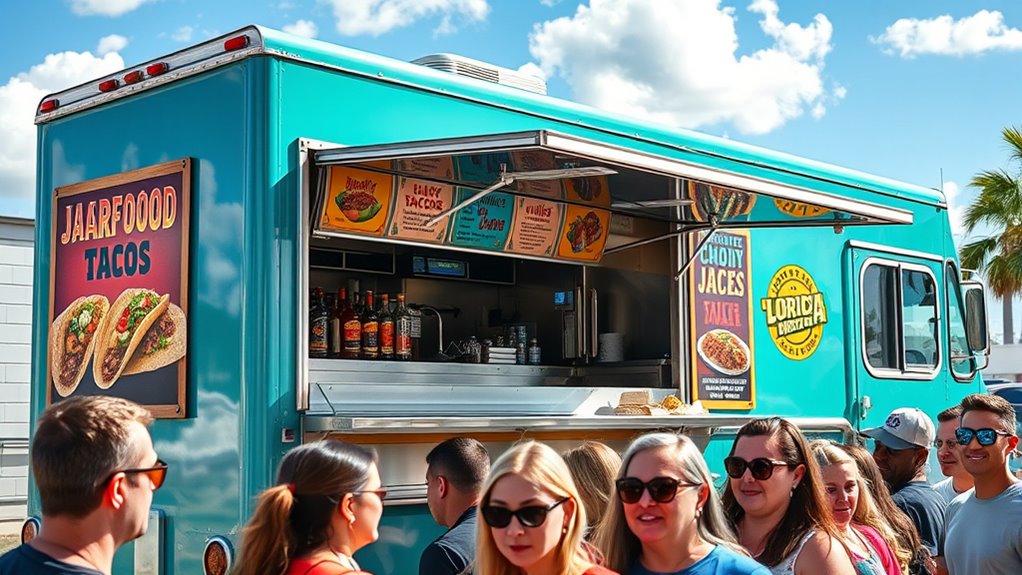
When designing your menu, consider sourcing ingredients locally to keep costs manageable and highlight fresh flavors. Calculating ingredient costs accurately helps set prices that cover expenses while attracting customers. Focusing on local sourcing and precise cost calculations guarantees your menu is both appealing and profitable.
Local Ingredient Sourcing Strategies
To create a menu that resonates with local customers and supports nearby farmers, you need to focus on sourcing ingredients from Jacksonville’s regional suppliers. This approach guarantees freshness and authenticity while building community relationships. Consider these strategies:
- Partner with local farms to access seasonal produce, which keeps your menu vibrant and cost-effective.
- Prioritize regional suppliers who can deliver fresh ingredients regularly, reducing transportation time.
- Incorporate seasonal produce into your dishes to highlight local flavors and adapt to availability.
- Build relationships with farmers and vendors to negotiate better prices and gain insights on peak harvest times.
Ingredient Cost Calculations
Understanding your ingredient costs is essential for designing a menu that balances flavor, quality, and profitability. Conducting a thorough cost analysis helps you determine accurate ingredient pricing, ensuring each dish contributes to your bottom line. Start by tracking the cost of every ingredient used in your recipes, including spices, proteins, and produce. This provides a clear picture of your food costs. Use this data to set menu prices that cover expenses while remaining competitive. Remember, consistent cost analysis allows you to adjust your pricing as ingredient prices fluctuate. By managing ingredient costs effectively, you’ll maximize profits without sacrificing quality, making your food truck business sustainable and successful in Jacksonville’s vibrant market.
Technology and Operations
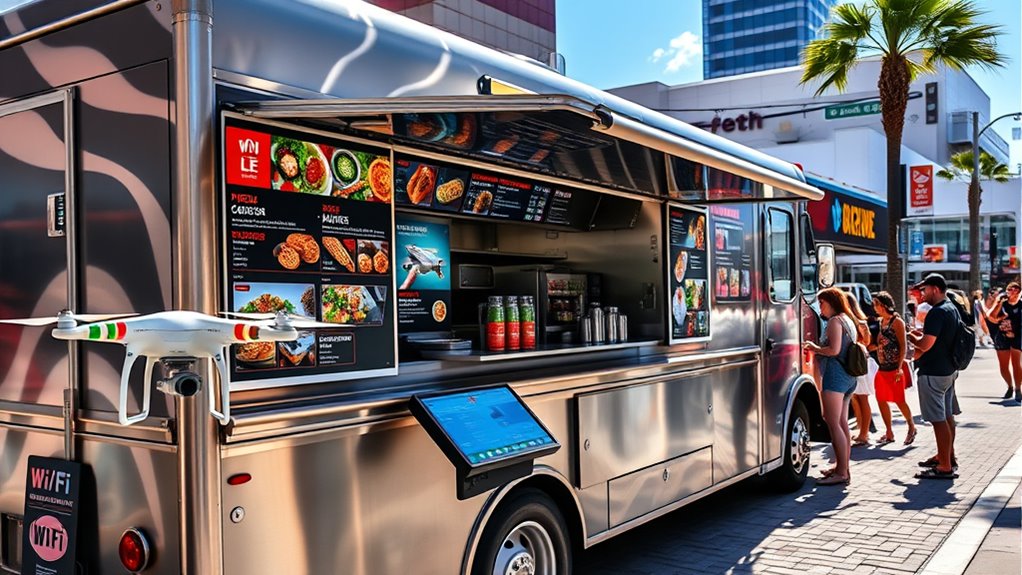
Using wireless card readers and apps can speed up transactions and reduce errors at your truck. Mobile POS and inventory apps help you track sales and stock levels in real time, so you stay on top of your business. Integrating these technologies makes your operations smoother and more efficient. Leveraging email marketing tools can also enhance customer engagement and promote your food truck effectively.
Wireless Card Readers and Apps
Implementing wireless card readers and apps is essential for streamlining your food truck’s payment process. They enable fast, secure digital payment and contactless transactions, improving customer experience. With mobile apps, you can accept various payment methods effortlessly. Here are four key benefits:
- Faster checkout times, reducing lines and wait times
- Enhanced security for customers’ payment data
- Compatibility with popular digital payment platforms like Apple Pay and Google Pay
- Easy integration with accounting and sales tracking systems
Using wireless card readers allows you to accept payments anywhere, whether you’re parked or at a busy event. This flexibility keeps your operation smooth and customer-friendly, boosting sales and reputation.
Mobile POS and Inventory Apps
Mobile POS and inventory apps build on the convenience of wireless payment systems by streamlining your daily operations. They simplify digital payment processing, making transactions faster and more secure. With inventory management features, you can track stock levels in real-time, reducing waste and avoiding shortages. These apps often sync with your sales data, giving you instant insights into popular items and sales trends.
| Feature | Benefit |
|---|---|
| Digital payment | Faster, secure transactions |
| Inventory management | Keeps stock levels accurate |
| Sales analytics | Helps optimize menu and pricing |
Marketing and Growing Your Presence
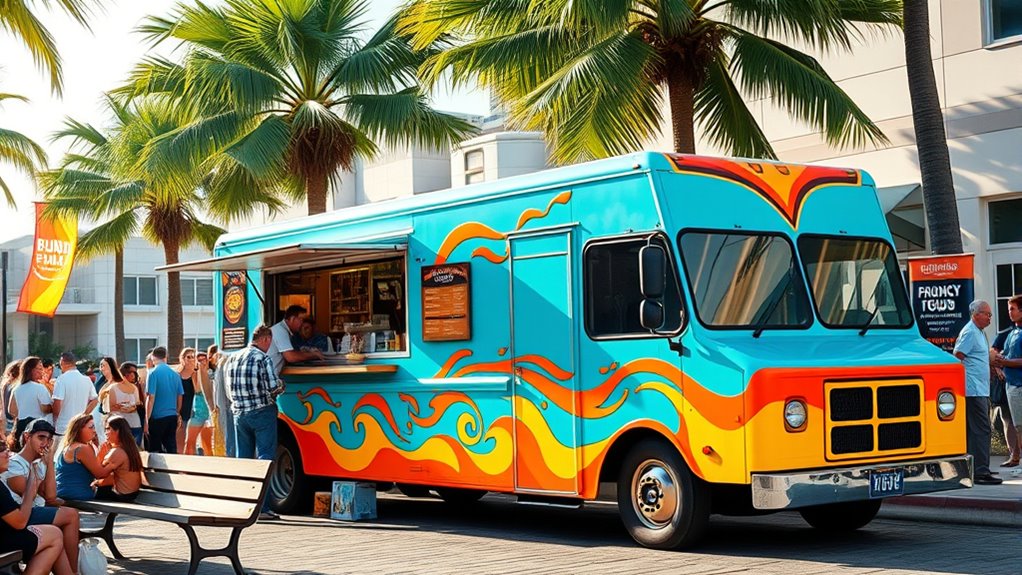
To grow your food truck’s presence, focus on popular event and market locations where your target customers gather. Use engaging Instagram food photos to showcase your dishes and attract more followers. Consistently promoting these spots and posts will help you build a loyal customer base in Jacksonville.
Popular Event and Market Locations
Choosing the right event and market locations is essential for growing your food truck’s presence in Jacksonville. To maximize exposure, focus on popular venues where crowds gather. Participating in food truck festivals can boost your visibility and attract new customers. Community markets provide consistent foot traffic and opportunities for local engagement. Consider these top locations:
- Food truck festivals like the Jacksonville Food Truck Festival
- Weekly community markets such as Riverside Arts Market
- Special events at local parks and beaches
- Food truck gatherings and rotating pop-up locations
Engaging Instagram Food Photos
Capturing eye-catching Instagram food photos is essential for building your food truck’s online presence and attracting new customers. Focus on food styling to make each dish look appetizing; arrange ingredients thoughtfully and choose appealing backgrounds. Good lighting is vital—shoot in natural light whenever possible to highlight vibrant colors. Use filter techniques sparingly to enhance the photo without overdoing it, maintaining an authentic look that appeals to viewers. Keep your shots simple but well-composed, emphasizing the textures and details of your food. Consistent styling and lighting help create a recognizable aesthetic for your brand. Remember, engaging photos can turn casual scrollers into loyal customers, so invest time into perfecting your food photography skills.
Local Networking Opportunities

Networking plays a essential role in launching and growing your food truck business in Jacksonville. Connecting with the local community and attending networking events can open doors to new customers, partnerships, and insights. By engaging actively, you’ll build relationships that boost your visibility.
Here are four ways to leverage local networking opportunities:
- Attend local food festivals and markets to showcase your truck and connect with fellow vendors.
- Join Jacksonville’s business associations or food truck groups to exchange tips and resources.
- Participate in community charity events to strengthen ties and gain positive exposure.
- Use social media to find informal meetups or industry-specific networking events.
Consistent engagement helps you establish a strong presence in Jacksonville’s vibrant local community, fueling your business growth.
Frequently Asked Questions
What Permits Are Needed for Outdoor Food Truck Events in Jacksonville?
You’ll need several permits for outdoor food truck events in Jacksonville. First, secure a mobile food vendor permit and guarantee your truck passes health inspection requirements. Check parking regulations to confirm you can operate in your chosen location without issues. Additionally, obtain event-specific permits if needed. Always coordinate with local authorities to stay compliant, avoid fines, and ensure smooth operation during your outdoor food truck events.
How Can I Find Reliable Food Truck Suppliers in Jacksonville?
Finding reliable food truck suppliers in Jacksonville is easier than finding a needle in a haystack—unless you actually want a needle, then good luck. Start by researching local vendors, checking reviews, and asking fellow food truck owners for recommendations. Make certain they offer quality ingredients, good food truck insurance options, and flexible menu pricing strategies. Trustworthy suppliers will help you serve delicious eats and keep your truck rolling smoothly through Jacksonville’s vibrant food scene.
Are There Any Local Food Truck Associations or Networking Groups?
Yes, you can find food truck networking and local food groups in Jacksonville. Joining these groups helps you connect with other vendors, share tips, and find opportunities. Look for Jacksonville food truck associations on social media or local event boards. Attending food truck meetups and festivals also boosts your networking. These groups are valuable for building relationships, gaining insights, and growing your food truck business in the Jacksonville area.
What Are the Common Challenges Faced by Food Truck Owners in Jacksonville?
Imagine steering Jacksonville’s busy streets like a boat in choppy waters—you’ll face seasonal fluctuations that affect your sales and parking restrictions that limit where you can operate. These are common challenges for food truck owners here. You’ll need to adapt quickly, plan around fluctuating demand, and find strategic spots. Staying flexible and informed helps you sail smoothly through Jacksonville’s vibrant but sometimes tricky food scene.
How Can I Effectively Handle Waste Disposal and Sanitation Requirements?
You should establish a waste management plan that includes regular disposal of trash and grease, following Jacksonville’s local regulations. Practice strict sanitation by routinely cleaning surfaces, utensils, and equipment, and use proper handwashing techniques. Keep trash bins covered and away from food prep areas. Implementing these sanitation practices not only keeps your truck compliant but also guarantees food safety and customer satisfaction, making your food truck operation more successful.
Conclusion
Starting your food truck journey in Jacksonville is like planting a seed that’ll bloom with delicious success. With passion, planning, and a sprinkle of perseverance, you’ll turn your culinary dreams into a vibrant reality on wheels. Embrace the city’s lively food scene and connect with locals to make your mark. Remember, every great adventure begins with a single step—so hit the road and let your flavors paint the town!
